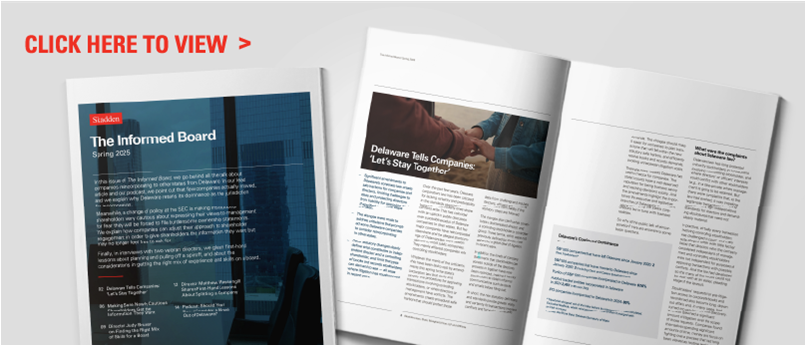Well-run boards are constantly evaluating their own make-up, including the optimal mix of skills and experience among their directors. In an interview with The Informed Board, Judy Bruner discusses the ways in which a variety of backgrounds helps make a board effective. Bruner is currently a director at Applied Materials, Qorvo, Rapid7 and Seagate Technology, and previously served on the board of Varian Medical Systems and Brocade Communications. She was previously CFO of SanDisk and Palm.
How do the varied experiences and skills of other directors contribute to board discussions and decision-making?
From my experience serving on boards for over 20 years, I believe it takes a mosaic of skills to be effective. At least a few members of the board should have deep experience in the industry the company operates in because they are familiar with the products, customers, suppliers and cycles of the industry. This familiarity provides valuable pattern recognition in determining both strategic and operational decisions for the company.
Someone with go-to-market expertise… can help with decisions about channel partners, geographies and sales strategies…. If the company has a complex supply chain or manufacturing process, having someone with experience in those areas is beneficial.
And what about directors from outside the industry?
Having some directors from outside the industry can be very helpful too. They ask questions that industry insiders might not think to ask, bringing a fresh perspective that can be valuable in decision-making.
What about functional expertise?
Functional expertise is also crucial. Boards often draw from CEO and CFO backgrounds, but executives from other areas can add significant value. For example, someone with go-to-market expertise, such as a former sales or service executive, can help with decisions about channel partners, geographies and sales strategies. Similarly, if the company has a complex supply chain or manufacturing process, having someone with experience in those areas is beneficial. Government expertise is becoming more valuable due to changing policies, and technology experts can help with both developing and commercializing new technologies.
How does the range of directors’ experience come into play in the board’s oversight role?
The most important job of the board is oversight — oversight of strategy and decisions, though not necessarily making those decisions. While functional expertise is valuable, it’s crucial to have directors with C-level experience who understand governance and have dealt with investors and public markets. This experience is essential for strong governance.
There’s been talk about having specific expertise like cybersecurity or climate issues on boards. What’s your take on that?
While it’s beneficial to have expertise in areas like cybersecurity, it’s not always necessary to have someone at every board meeting. You can hire experts as needed. If you can find someone who adds strategic value to the board and also has specific knowledge such as cybersecurity, that’s ideal. For example, one of my companies brought on a C-level executive with IT and cybersecurity expertise. This executive was added to the board for the strategic value they could contribute, and the IT and cybersecurity expertise made this board addition a win-win. I believe the first priority should be to identify directors who can provide broad strategic value and governance experience.
What about human resources expertise?
I haven’t often seen boards specifically looking for chief human resources officer — CHRO — expertise, but human capital is always important. Most directors have dealt with a wide array of human capital issues in their roles as CEOs or other C-level executives. Compensation committees are broadening their focus to include human capital issues, and I believe this will lead to some searches focused on CHRO expertise, but so far, I see boards typically bringing in third-party experts or the company’s CHRO for specific issues.
How do you screen for directors who might dominate discussions?
The best way to screen for that is through deep reference checks with people who have sat on a board with the individual, especially in the same industry. This helps ensure the person understands the collaborative nature of board work and will enhance rather than disrupt the board culture and decision-making.
Can you give an example of how different directors’ experiences have shaped a debate?
Sure. In a discussion about capital allocation, a director with a Wall Street background might advocate for higher dividends and share repurchases to increase shareholder value. In contrast, a director with operating experience might be more risk-averse, having dealt with downturns and preferring to maintain liquidity and low leverage. The key is finding a balance between these perspectives. Another example is in discussing the best approach to commercializing a new product in Asia, a board member who had lived extensively in the region was able to add valuable perspective on the marketing approach and the importance of local presence.
Any final thoughts?
It’s important to have a mix of industry expertise and outside perspectives on a board. This combination helps in making well-rounded decisions and provides valuable oversight.
View other articles from this issue of The Informed Board
- Delaware Tells Companies: ‘Let’s Stay Together’
- Making Sure Newly Cautious Shareholders Get the Information They Want
- Director Judy Bruner on Finding the Right Mix of Skills for a Board
- Director Matthew Massengill Shares Firsthand Lessons About Splitting a Company
- Podcast: Should Your Board Consider a Move Out of Delaware?
See all the editions of The Informed Board
This memorandum is provided by Skadden, Arps, Slate, Meagher & Flom LLP and its affiliates for educational and informational purposes only and is not intended and should not be construed as legal advice. This memorandum is considered advertising under applicable state laws.

